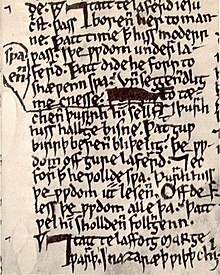
The Ormulum or Orrmulum is a twelfth-century work of biblical exegesis, written by an Augustinian canon named Orrm (or Orrmin) and consisting of just under 19,000 lines of early Middle English verse. Because of the unique phonemic orthography adopted by its author, the work preserves many details of English pronunciation existing at a time when the language was in flux after the Norman conquest of England. Consequently, it is invaluable to philologists and historical linguists in tracing the development of the language.
After a preface and dedication, the work consists of homilies explicating the biblical texts set for the mass throughout the liturgical year. It was intended to be consulted as the texts changed, and is agreed to be tedious and repetitive when read straight through. Only about a fifth of the promised material is in the single manuscript of the work to survive, which is in the Bodleian Library in Oxford.
Orrm developed an idiosyncratic spelling system. Modern scholars have noted that the system reflected his concern with priests' ability to speak the vernacular and may have helped to guide his readers in the pronunciation of the vowels. Many local priests may have been regular speakers of Anglo-Norman French rather than English. Orrm used a strict poetic metre to ensure that readers know which syllables are to be stressed. Modern scholars use these two features to reconstruct Middle English as Orrm spoke it.[1]
- ^ Burchfield 1987, p. 280